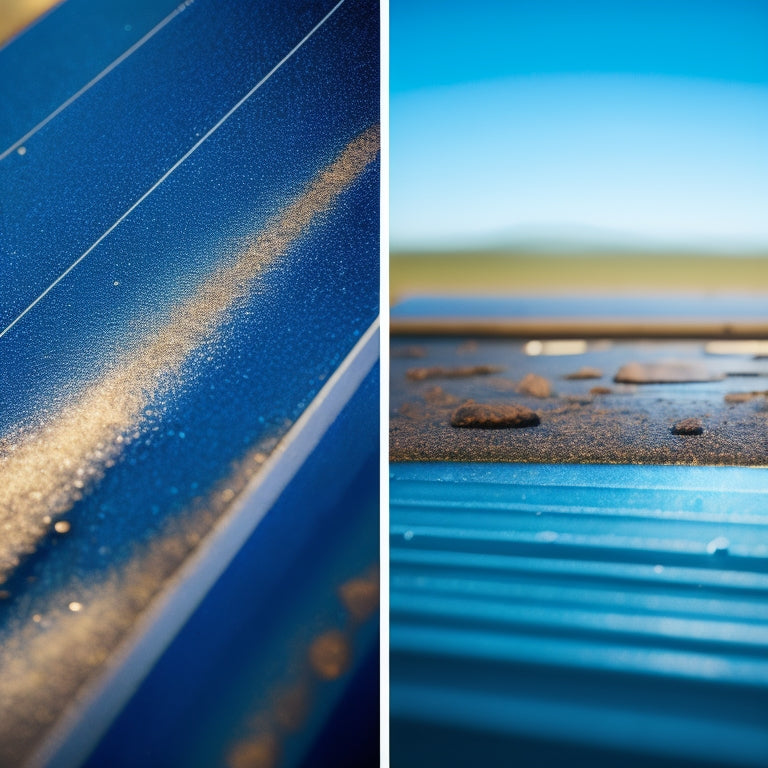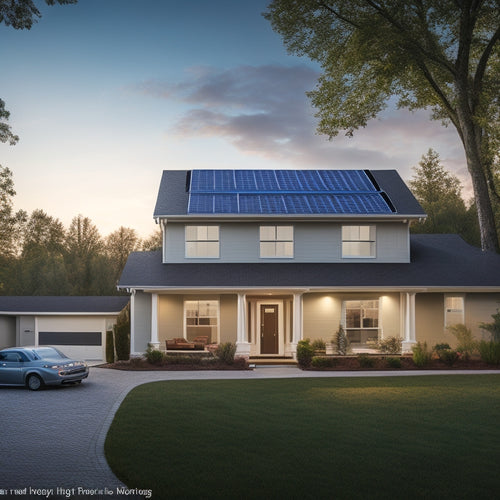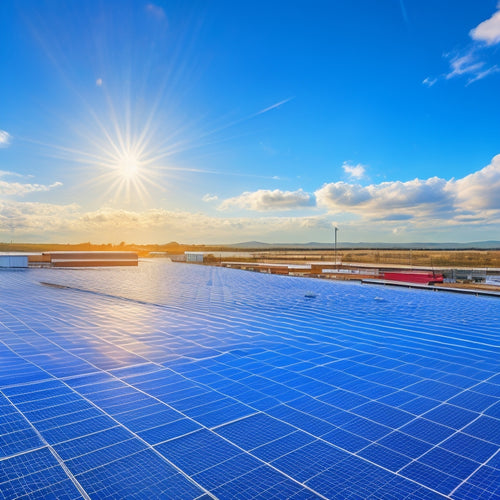
What if You Clean Solar Panels With Water?
Share
When you clean solar panels with water, you'll increase energy output by up to 20%, making it a vital maintenance task to maximize your return on investment. Water cleaning is an eco-friendly and effective method to reduce dust accumulation, which can lead to a 25% loss in energy production. By mixing micro-scrubbers with water, you'll create a gentle yet effective cleaning solution that won't scratch your panels. The ideal cleaning frequency depends on environmental factors, and the right micro-scrubber type can make all the difference. Now that you know the benefits, investigate the best cleaning techniques and best practices to get the most out of your solar panels.
At a Glance
- Cleaning solar panels with water can increase energy output by up to 20% due to improved sunlight absorption.
- Water-based cleaning is an eco-friendly method that reduces dust accumulation and maintains panel integrity.
- Mixing micro-scrubbers with water creates a gentle yet effective cleaning solution that prevents scratching and damage.
- Regular water-based cleaning prevents long-term damage, reduces energy loss, and enhances overall solar panel efficiency.
- Water-based cleaning solutions promote water conservation, minimize chemical contamination, and support sustainable practices.
Higher Energy Output Guaranteed
You'll achieve max power generation when your solar panels are free of dirt and debris, as clean panels can produce up to 25% more energy than dirty ones.
By investing in renewable energy solutions like Solar Power and Battery Storage, homeowners can break free from reliance on the grid and reduce their electricity bills.
By cleaning your solar panels with water, you'll experience increased efficiency gains, leading to higher energy output.
This results in a more efficient system, reducing the payback period of your solar investment.
Max Power Generation
By maximizing power generation, solar panel owners can reap the full benefits of their investment, ensuring a higher energy output that meets their needs. You can achieve this by prioritizing solar panel maintenance, which involves regular cleaning to remove dirt, dust, and debris that hinder energy production.
Water is an effective and eco-friendly cleaning agent for this purpose. By using water to clean your solar panels, you can increase their energy output by up to 25%. This is because clean panels can absorb more sunlight, resulting in higher power generation.
Additionally, integrating a battery storage system into your solar setup can further enhance your energy output and provide a more sustainable power solution. Regular water-based cleaning also helps prevent long-term damage to your solar panels.
Dirt and debris can cause micro-scratches on the panel surface, reducing their efficiency over time. By keeping your panels clean, you can prevent these scratches and maintain their peak performance.
With proper maintenance, you can enjoy a higher return on investment and a greater sense of energy independence. By taking control of your solar panel maintenance, you're taking a significant step towards maximizing your power generation and reaping the full benefits of renewable energy.
Increased Efficiency Gains
Optimum energy harvesting is contingent upon the seamless interaction between solar panels and their environment. You understand that a clean solar panel is vital to maximize energy output. By utilizing water for cleaning, you can guarantee that your solar panels operate at their highest efficiency.
Efficient battery storage solutions, such as Lithium-Ion Batteries, also play an essential role in storing excess energy for later use. Furthermore, a reliable backup during power outages can be achieved with solar battery backup systems.
Increased efficiency gains are directly proportional to the frequency of cleaning. Dust and debris accumulation on the panel's surface reduce energy output, and regular cleaning with water helps mitigate this loss.
With clean solar panels, you can expect a significant enhancement in energy production. In fact, studies have shown that cleaning solar panels with water can increase energy output by up to 20%. This increase in energy output translates to higher savings on your energy bills and a reduced carbon footprint.
Reduced Dust Accumulation Rate
When you clean your solar panels with water, you'll notice a reduced dust accumulation rate. This is especially important for off grid solar systems where energy storage solutions are vital.
Moreover, utilizing renewable energy systems with integrated solar panel energy storage solutions can maximize your energy savings. This is because the water helps to maintain a smooth surface finish, making it more difficult for dust particles to settle.
Additionally, applying a dust repellent coating to your panels can additionally reduce dust accumulation, ensuring your panels remain efficient for a longer period.
Dust Repellent Coating
Across the solar panel's surface, a dust repellent coating can greatly reduce the dust accumulation rate, thereby maintaining the panel's energy output.
As you consider applying such a coating, you'll want to assess its longevity. A coating that can withstand the elements for an extended period will require less frequent reapplication, reducing maintenance costs and minimizing downtime.
When selecting a dust repellent coating, you should also consider the application techniques. Some coatings may require specialized equipment or knowledge, adding to their overall cost.
Others may be simpler to apply, making them a more practical choice for your solar panel array. Additionally, you'll want to verify the coating is compatible with your panel's materials and won't compromise their performance.
Smooth Surface Finish
By minimizing the texture and roughness of the solar panel's surface, you can greatly reduce the dust accumulation rate. A smooth surface finish allows for more efficient water cleaning, as there are fewer crevices for dirt and debris to accumulate in.
This, in turn, reduces the frequency of cleaning required to maintain peak energy output. With a smooth surface, you'll spend less time and resources on surface maintenance, giving you more freedom to focus on other aspects of your solar panel system.
Additionally, a smooth surface finish helps to reduce the electrostatic charge that attracts dust particles, making it even more difficult for dirt to accumulate. This means you'll need to clean your solar panels less often, reducing the wear and tear on the surface and extending its lifespan.
Micro-Scrubbers for Gentle Cleaning
When you're looking for a gentle cleaning solution, micro-scrubbers are an effective option.
As homeowners increasingly rely on renewable energy sources like solar power storage off-grid solutions, it's crucial to maintain their efficiency.
These tiny scrubbers are designed to remove dust and debris without scratching the solar panel's surface, ensuring maximum energy output.
Gentle Cleaning Solution
With micro-scrubbers, you can create a gentle cleaning solution that effectively removes dirt and debris from your solar panels without causing damage. This solution composition is vital in maintaining the best performance of your solar panels.
By mixing micro-scrubbers with water, you can create a solution that's gentle on the panels yet tough on dirt and grime. The frequency of cleaning will depend on the environment and climate you're in. If you're in an area with high levels of air pollution or dust, you may need to clean your solar panels more frequently.
When creating your gentle cleaning solution, it's important to get the concentration of micro-scrubbers just right. Too little, and the solution may not be effective; too much, and you risk damaging the panels. A good starting point is to mix one part micro-scrubbers with ten parts water. This will give you a solution that's gentle yet effective.
Remember to always spot test the solution on a small area of the panel before applying it to the entire surface. By following these guidelines, you can guarantee your solar panels remain clean and efficient, generating maximum power for your freedom.
Effective Dust Removal
Removing stubborn dust and debris from your solar panels requires a gentle yet effective approach, ensuring maximum energy output without compromising the panel's integrity. You need a cleaning technique that's both thorough and gentle, and that's where micro-scrubbers come in. These tiny scrubbers are designed to remove stubborn particles without scratching the panel's surface.
| Micro-Scrubber Type | Effectiveness | Water Conservation |
|---|---|---|
| Soft-bristle brush | 8/10 | 7/10 |
| Microfiber cloth | 9/10 | 8/10 |
| Electrostatic duster | 8.5/10 | 9/10 |
| Deionized water spray | 9.5/10 | 9.5/10 |
When choosing a micro-scrubber, consider the type of debris you're dealing with and the level of water conservation you need. For example, if you're in a water-scarce area, an electrostatic duster or deionized water spray might be a better option. By combining the right micro-scrubber with a gentle cleaning solution, you'll be able to remove dust and debris effectively while preserving your solar panels' integrity and conserving water.
Panel Tilt Affects Cleaning
When you're cleaning your solar panels, you'll want to take into account the tilt of the panels, as it directly affects the cleaning process.
Ensuring your panels are at a favorable angle is vital, especially when using off-grid solar systems that rely on efficient energy harvesting.
The ideal angle of your panels matters, as it influences the flow of water across the surface.
If the tilt is off, water may not flow evenly, leaving dirt and debris behind, which is why it's important to get it right.
Ideal Angles Matter
As you position your solar panels, you'll want to contemplate the ideal angle to maximize energy output, but this tilt also impacts how easily dirt and debris can be cleaned from the surface.
The ideal angle for cleaning depends on various factors, including the local climate, vegetation, and surrounding environment.
A steeper panel orientation can lead to more frequent cleaning, as debris tends to accumulate at the bottom of the panel. On the other hand, a shallower angle may require less frequent cleaning, but it can also reduce energy output.
You should consider the trade-off between energy output and cleaning frequency when determining the ideal angle for your solar panels.
In regions with high levels of airborne debris or heavy vegetation, a steeper angle may be necessary to guarantee superior energy production. In areas with low levels of debris, a shallower angle might be suitable, reducing the need for frequent cleaning.
Tilt Impacts Water Flow
How effectively does water flow across your solar panels during cleaning, and what role does the tilt play in this process? The answer lies in understanding how panel angle affects cleaning efficiency.
When you clean your solar panels with water, the tilt of the panel notably impacts water flow. A steeper panel angle allows water to flow more easily, reducing the likelihood of water pooling and dirt accumulation. Conversely, a shallower angle can lead to water stagnation, making it more challenging to remove dirt and debris.
The ideal panel angle for water flow depends on various factors, including the type of cleaning method used and the surface texture of the panels. Generally, a tilt of 10-20 degrees is regarded as best for water flow, allowing for efficient cleaning and minimizing water waste.
However, it's crucial to take into account your specific solar panel setup and adjust the tilt accordingly to guarantee effective cleaning and maximum energy output. By fine-tuning your panel angle, you can maximize the benefits of cleaning your solar panels with water and maintain their performance over time.
Less Chemicals Used Here
When you clean your solar panels with water, you're reducing your reliance on chemical-based cleaning solutions.
This approach minimizes the amount of chemicals released into the environment, which can contaminate soil and water sources.
Reduced Environmental Impact
By opting for water-based cleaning solutions, you greatly reduce the environmental impact of solar panel maintenance. You're not only minimizing the use of harsh chemicals but also promoting water conservation.
The traditional method of cleaning solar panels often involves chemical-laden cleaners, which can contaminate waterways and harm local ecosystems. By switching to water-based solutions, you're ensuring that the water used for cleaning is free from pollutants, thereby protecting the ecosystem.
Using water for cleaning solar panels also reduces the risk of chemical runoff, which can seep into the soil and groundwater, causing long-term damage to the environment.
Additionally, water-based cleaning solutions are biodegradable, making them a more sustainable option. By adopting this eco-friendly approach, you're contributing to a cleaner and healthier environment.
Your decision to use water-based cleaning solutions not only benefits the environment but also supports your commitment to freedom from harmful chemicals and a cleaner future.
Frequently Asked Questions
Can I Use Tap Water to Clean Solar Panels?
You shouldn't use tap water for cleaning solar panels, as it may contain minerals that leave streaks and spots, reducing efficiency. Instead, opt for deionized or distilled water and gentle cleaning methods to guarantee maximum performance.
Will Hard Water Leave Mineral Deposits on Panels?
When you clean solar panels, you'll find that hard water indeed leaves mineral deposits, as its high calcium and magnesium content reacts with the panel's surface, necessitating prevention measures like using deionized water or a water softener to maintain efficiency.
How Often Should I Water-Clean Solar Panels?
You'll want to determine the ideal cleaning frequency for your solar panels based on local environmental conditions, as excessive cleaning can waste resources; aim to clean every 6-12 months to balance energy output with minimal environmental impact.
Can I Use a Hose With High Pressure to Clean?
When using a hose, you'll want to avoid high pressure, as it can damage panels or dislodge debris, compromising efficiency. Instead, opt for gentle cleaning techniques, as excessive pressure impacts panel performance and longevity, hindering your energy independence.
Will Water Cleaning Void My Solar Panel Warranty?
You're likely aware that 85% of solar panels are never cleaned, resulting in significant energy losses. When it comes to warranty implications, you'll want to check your specific contract, as some manufacturers may void warranties if improper cleaning techniques, like high-pressure hoses, are used.
Explore More
As you opt to clean your solar panels with water, you're revealing a wealth of benefits. With a higher energy output promised, you'll be reaping the rewards of a sparkling clean system. The reduced dust accumulation rate means less maintenance for you, and micro-scrubbers guarantee a gentle touch. Remember, panel tilt affects cleaning, so adjust accordingly. By ditching harsh chemicals, you're giving the environment a breather. The result? A clean, efficient, and eco-friendly system that's music to your ears - and your wallet.
Related Posts
-

Is This the Future of Alternative Energy Systems
Yes, alternative energy systems are shaping the future of energy. Innovations in solar and wind technologies are driv...
-

Cost of Solar With Battery Backup
You're investing in a solar panel system with battery backup to guarantee reliable power during outages. The cost of ...
-

Commercial Solar Energy
As you consider powering your business with commercial solar energy, you'll uncover it offers a triple benefit: signi...


